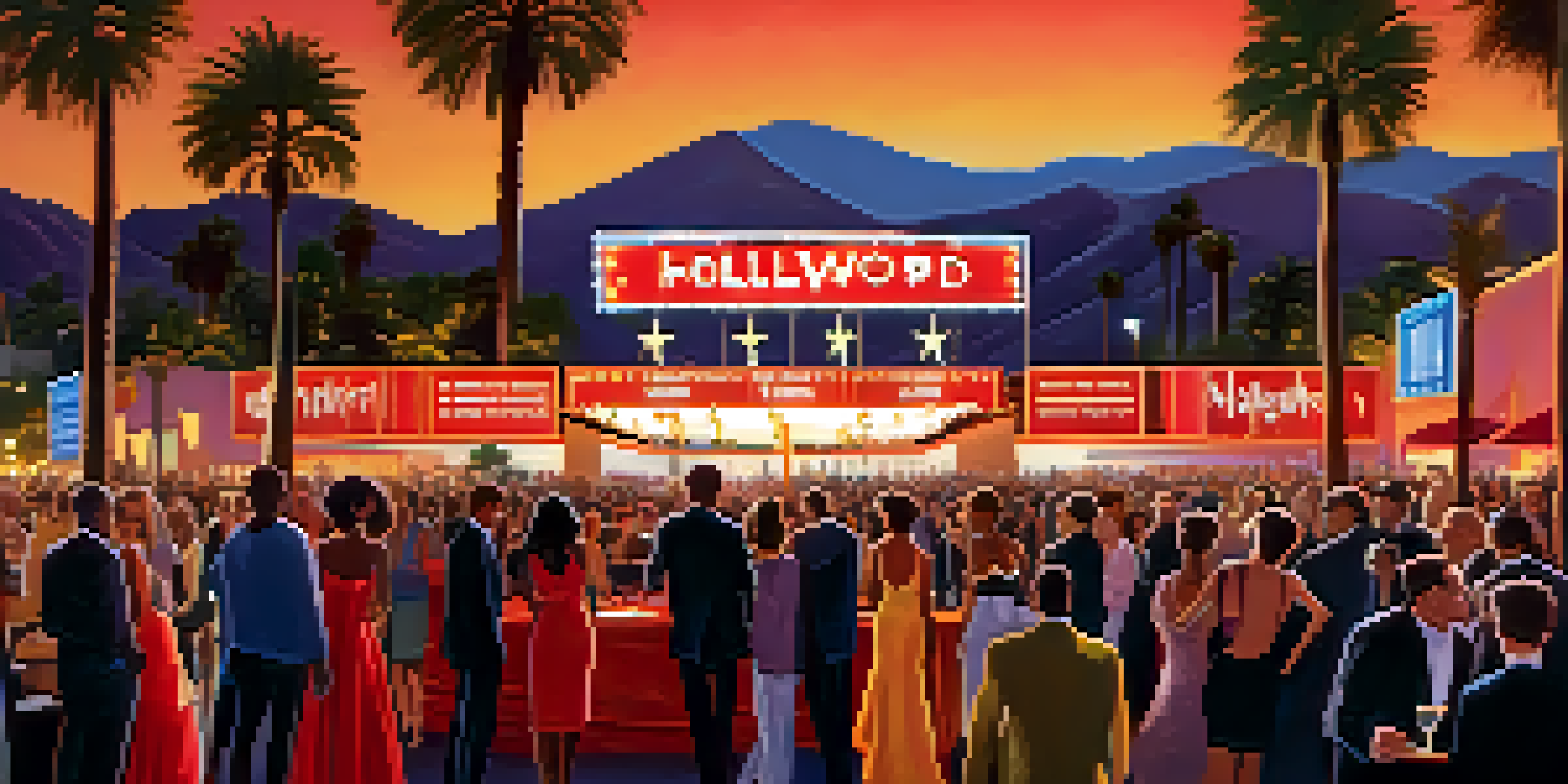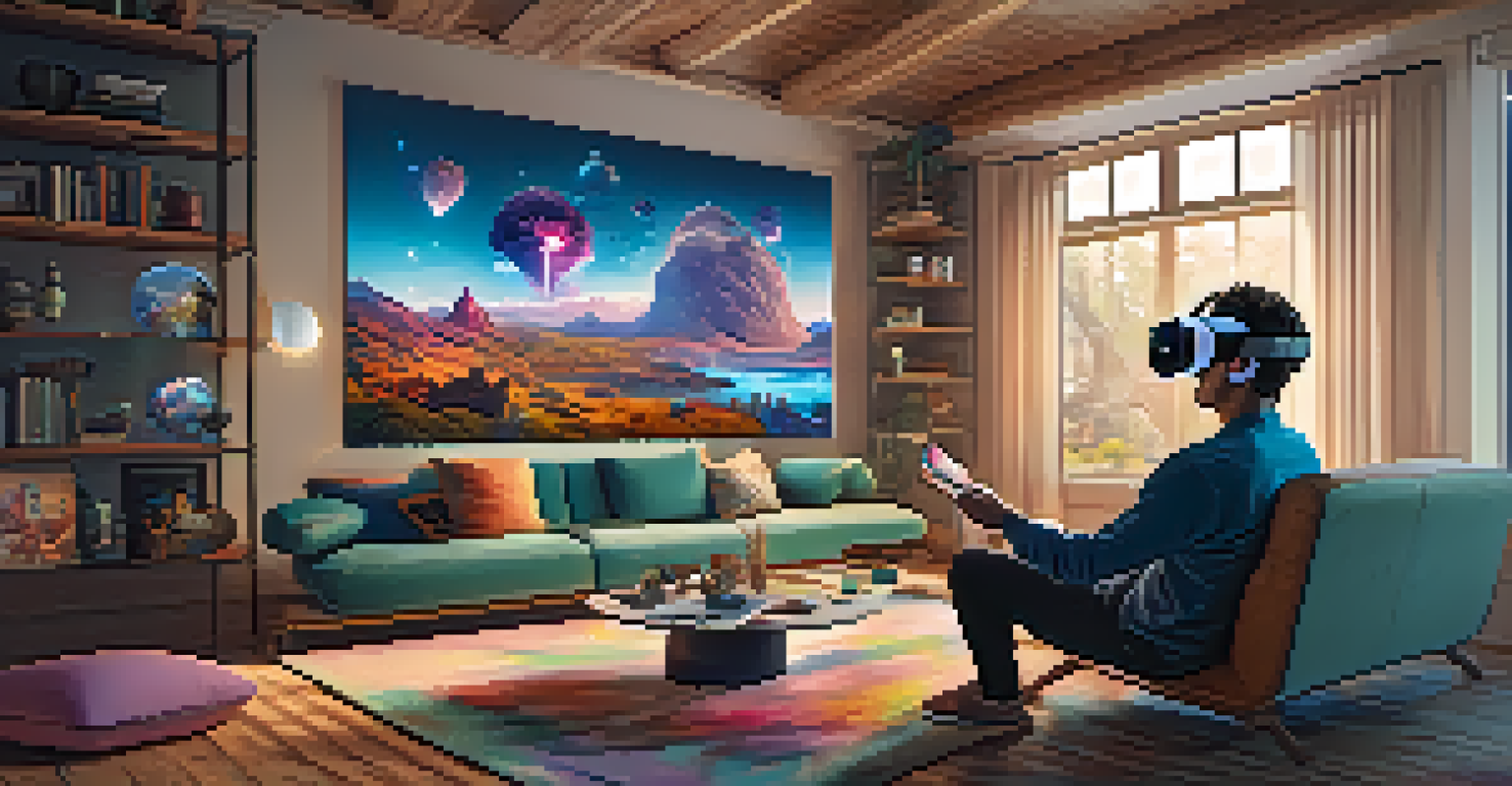The Future of Storytelling: Hollywood's Role in Global Narratives

Hollywood's Historical Influence on Storytelling
Hollywood has long been synonymous with storytelling, shaping narratives that resonate across cultures. From classic films to modern blockbusters, its influence has transcended borders, offering a window into the American experience. This historical impact has laid the groundwork for Hollywood's continued relevance in global storytelling.
Storytelling is the most powerful way to put ideas into the world today.
Take, for instance, the rise of film festivals like Cannes and Sundance, which celebrate diverse voices and stories from around the world. These events not only spotlight international filmmakers but also highlight Hollywood's role in promoting these narratives to a wider audience. This synergy reinforces the idea that storytelling is a shared human experience.
As we look to the future, Hollywood's ability to adapt and embrace global narratives will be crucial. By collaborating with international filmmakers and producers, Hollywood can diversify its storytelling palette, enriching its own narratives while amplifying voices from all corners of the globe.
The Power of Digital Platforms in Storytelling
The rise of digital platforms has transformed how stories are told and consumed, allowing for greater accessibility and diversity. Streaming services like Netflix and Amazon Prime have opened doors for international content, giving audiences a taste of stories from different cultures. This shift is a game-changer for Hollywood, which must now navigate a more global landscape.

For example, shows like 'Money Heist' and 'Lupin' have found massive popularity outside their home countries, proving that audiences are hungry for diverse narratives. Hollywood is beginning to recognize this trend, prompting studios to invest in international productions and co-productions that resonate with global viewers. This collaboration is not just beneficial; it's essential for staying relevant.
Hollywood's Global Storytelling Shift
Hollywood's collaboration with international filmmakers is essential for diversifying narratives and reflecting a broader range of cultural perspectives.
As these digital platforms continue to evolve, the potential for storytelling will only expand. Hollywood's challenge will be to embrace this change, integrating various cultural perspectives into mainstream narratives that reflect our interconnected world.
Embracing Diversity in Hollywood Narratives
Diversity in storytelling is not merely a trend; it’s a necessity for Hollywood’s future. Audiences today expect stories that reflect a multitude of experiences and identities, pushing filmmakers to move beyond traditional tropes. This shift is not only beneficial for representation but also enriches the storytelling landscape as a whole.
Diversity is being invited to the party; inclusion is being asked to dance.
Movies like 'Black Panther' and 'Crazy Rich Asians' demonstrate that diverse stories can achieve both critical acclaim and box office success. These films have paved the way for a broader acceptance of narratives that celebrate different cultures and perspectives. Such success stories highlight the importance of inclusivity in Hollywood's storytelling approach.
As Hollywood continues to embrace diversity, it must also ensure that these narratives are authentic. Collaborations with diverse creators and communities will be essential to tell stories that resonate deeply and genuinely with audiences worldwide.
The Role of Technology in Shaping Narratives
Technological advancements are revolutionizing storytelling, offering new ways to engage audiences. Virtual reality (VR) and augmented reality (AR) are emerging tools that allow viewers to experience stories in immersive ways, transforming traditional narratives. Hollywood is beginning to explore these technologies to enhance storytelling and create interactive experiences.
Consider how VR experiences can transport audiences into the heart of a story, allowing them to engage in ways that were previously unimaginable. Films that incorporate AR elements can bridge the gap between the digital and physical worlds, making storytelling more dynamic. This technological evolution promises to reshape how narratives are crafted and consumed.
Digital Platforms Redefining Access
The rise of streaming services has expanded audience access to diverse stories, prompting Hollywood to adapt its storytelling approach.
As Hollywood continues to innovate, it must balance creativity with a thoughtful approach to technology. By integrating these tools responsibly, filmmakers can enhance their stories while ensuring they remain accessible and engaging to all audiences.
Cultural Exchange Through Global Collaborations
Global collaborations are becoming increasingly vital in storytelling, as they foster cultural exchange and understanding. By partnering with filmmakers from different backgrounds, Hollywood can create richer, more nuanced narratives that reflect the complexities of our world. These collaborations also help break down cultural barriers, promoting empathy and connection.
For instance, films like 'The Farewell' showcase the beauty of collaborating with international talent, blending cultural influences to create a relatable yet unique narrative. Such partnerships not only elevate the story but also highlight the shared human experiences that transcend borders. They remind us that storytelling is a universal language.
As Hollywood embraces global collaborations, it can position itself as a leader in fostering cultural exchange. This approach will not only enhance the storytelling landscape but also contribute to a more inclusive and interconnected global community.
The Impact of Audience Demand on Storytelling
Audience demand has a profound impact on storytelling, shaping the types of narratives that are produced. With the rise of social media and online platforms, viewers now have a louder voice, influencing what gets told and how. This shift in power dynamics is reshaping Hollywood's approach to storytelling, encouraging studios to listen closely to audience feedback.
For instance, the success of fan-driven campaigns for shows like 'Brooklyn Nine-Nine' and 'Lucifer' demonstrates how audience engagement can revive and sustain narratives. Hollywood is increasingly recognizing that audience preferences can guide storytelling decisions, leading to more authentic and relevant narratives. This responsiveness is key to maintaining audience loyalty.
Diversity Drives Future Narratives
Embracing diversity in storytelling is crucial for Hollywood, as audiences increasingly demand authentic representation of varied experiences.
As the landscape continues to evolve, Hollywood must remain agile in adapting to audience demands. By understanding and engaging with viewers, filmmakers can create stories that resonate deeply, ensuring that the narratives produced are reflective of the diverse audience they aim to serve.
The Future of Storytelling: A Collaborative Effort
The future of storytelling in Hollywood hinges on collaboration, both within the industry and across cultures. As the storytelling landscape becomes more interconnected, collaboration can lead to innovative narratives that draw from a wealth of experiences and perspectives. This collaborative approach is essential for adapting to an ever-changing global audience.
By working together, filmmakers can push the boundaries of creativity, blending genres and styles to craft unique stories that captivate viewers. The fusion of different cultural elements can lead to fresh, exciting narratives that challenge conventional storytelling norms. This creative synergy will be crucial in shaping the future of Hollywood storytelling.

Ultimately, the future of storytelling is about inclusivity, diversity, and collaboration. By embracing these values, Hollywood can continue to evolve, crafting narratives that not only entertain but also inspire and connect audiences around the world.